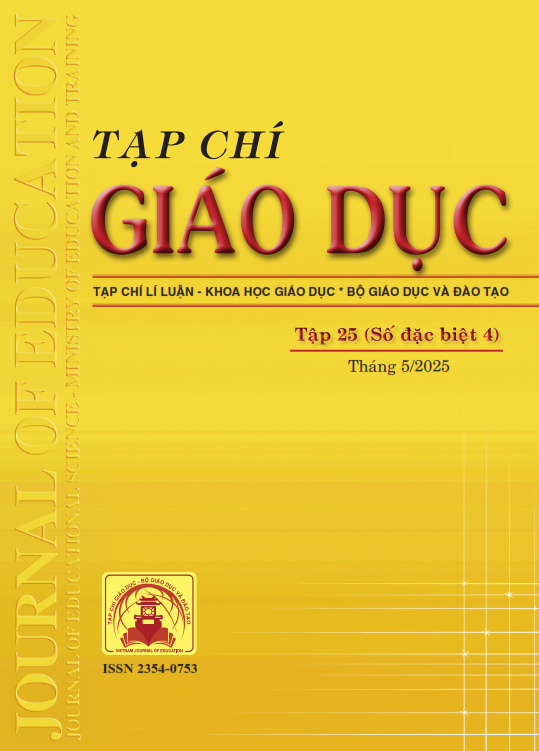Sử dụng thí nghiệm mô phỏng Gizmos trong dạy học môn Tự nhiên và Xã hội lớp 3
Tóm tắt
In the context of modern education, integrating technology into teaching is becoming increasingly common, especially in science subjects. This study focuses on using Gizmos interactive simulations in teaching Natural and Social Sciences in 3rd grade to enhance students' knowledge acquisition. The study aims to evaluate the effectiveness of this method through a pedagogical experiment on two groups (experimental and control classes). The results indicate that using simulations increases students' learning engagement and improves their academic performance. The statistically significant difference in scores between the two groups demonstrates the positive impact of this approach. Based on these findings, we recommend that schools and teachers promote the application of simulation technology in teaching. Additionally, training programs should be developed to help teachers effectively use these tools. Future research could extend to other subjects to assess the broader impact of simulations on education.
Tài liệu tham khảo
Bộ GD-ĐT (2018). Chương trình giáo dục phổ thông môn Tự nhiên và Xã hội (ban hành kèm theo Thông tư số 32/2018/TT-BGDĐT ngày 26/12/2018 của Bộ trưởng Bộ GD-ĐT).
Erlam, G. D., Smythe, L., & Wright-St Clair, V. (2017). Simulation is not a pedagogy. Open Journal of Nursing, 7(07), 779.
ExploreLearning (2019). Thư viện thí nghiệm mô phỏng Gizmos. https://gizmos.explorelearning.com/
Hoàng Thị Mỹ Linh (2017). Sử dụng thí nghiệm mô phỏng trong tổ chức hoạt động dạy học phần Sinh học tế bào, Sinh học 10. Luận văn thạc sĩ Giáo dục học, Trường Đại học Sư phạm - Đại học Huế.
Ismail, N. F. H., Shahrill, M., & Asamoah, D. (2023). Learning through virtual manipulatives: Investigating the impact of Gizmos-based lessons on students’ performance in integers. Contemporary Mathematics and Science Education, 4(1), ep23009.
Jaymar S. Dela Cruz, J. P. C. R. H. (2024). The influence of Gizmos digital simulation on the perceptions of grade 9 high School learner. Psychology and Education: A multidisciplinary Journal, 19(4), 495-505. https://doi.org/10.5281/ zenodo.11094161
Merchant, N. (2019). Virtual Experiments and Simulations in the Science Classroom. Honors Research Project, 972.
Niels Rutten, W. R. V. J., Jan T. Van der Veen (2012). Designing and Evaluating Simulations for Elementary Science Education. Journal of Educational Technology & Society, 15(4), 127-140.
Nguyễn Thị Hảo (2024). Sử dụng thí nghiệm mô phỏng có tương tác (PhET) nhằm bồi dưỡng thành phần năng lực tìm hiểu tự nhiên cho học sinh trung học cơ sở. Tạp chí Khoa học, Trường Đại học Sư phạm Hà Nội, 69(5), 143-152.
Nguyễn Thị Thu Hằng, Lê Thị Bình, Hoàng Văn Ngọc (2021). Giáo trình Cơ sở Tự nhiên - Xã hội 1. NXB Đại học Thái Nguyên.
Sutherland, S. (2022). The Impact of an Interactive Simulation Program on English Language Learner Achievement in a Middle School Science Classroom. University of South Carolina.
Tsai, C. Y., Ho, Y. C., & Nisar, H. (2021). Design and validation of a virtual chemical laboratory-An example of natural science in elementary education. Applied Sciences, 11(21), 10070.
Trần Tuyến (2024). Mô phỏng trong dạy học môn Thực hành Điện tử cơ bản cho sinh viên ngành Kĩ thuật điện. Tạp chí Khoa học Giáo dục Việt Nam, 20(6), 35-40.
Trịnh Đông Thư, Mai Hoàng Diễm, Hà Văn Dũng (2023). Sử dụng thí nghiệm ảo để tổ chức dạy học chủ đề “Trao đổi chất và chuyển hóa năng lượng ở thực vật” cấp trung học phổ thông. Tạp chí Giáo dục, 23(5), 17-22.
Đã Xuất bản
Cách trích dẫn
Số
Chuyên mục
Giấy phép

Tác phẩm này được cấp phép theo Ghi nhận tác giả của Creative Commons Giấy phép quốc tế 4.0 .












